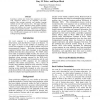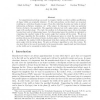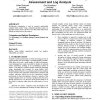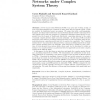2522 search results - page 212 / 505 » From Self-Organized Systems to Collective Problem Solving |
KDD
1998
ACM
14 years 1 months ago
1998
ACM
Learning to predict rare events from sequences of events with categorical features is an important, real-world, problem that existing statistical and machine learning methods are ...
CCCG
1996
13 years 10 months ago
1996
In computational metrology one needs to compute whether an object satis es speci cations of shape within an acceptable tolerance. To this end positions on the object are measured,...
GECCO
2005
Springer
14 years 2 months ago
2005
Springer
Evolutionary computation is used to construct undetectable computer attack scripts. Using a simulated operating system, we show that scripts can be evolved to cover their tracks a...
SOSP
1993
ACM
13 years 10 months ago
1993
ACM
Causally and totally ordered communication support (CATOCS) has been proposed as important to provide as part of the basic building blocks for constructing reliable distributed sy...
DNIS
2005
Springer
14 years 2 months ago
2005
Springer
: A Peer-to-peer Data Network (PDN) is an open and evolving society of peer nodes that assemble into a network to share their data for mutual benefit. PDNs are enabled by distribu...




